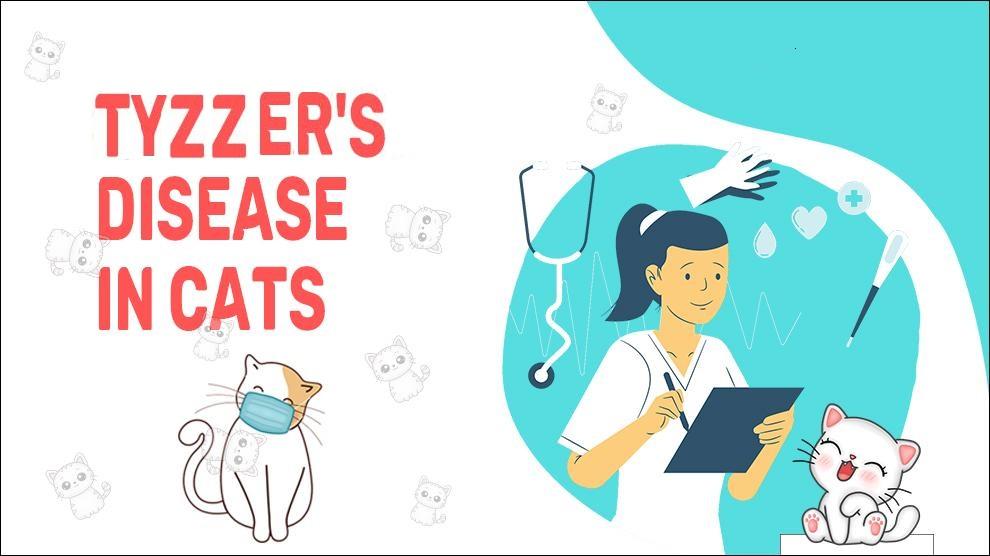* Petmoo is reader-supported. When you buy products via links on our site, we may earn an affiliate commission at no cost to you.

Table Of Contents
What Is Tyzzer’s Disease In Cats?
Tyzzer’s disease is a bacterial infection caused by the spore-forming bacteria, Clostridium piliforme.
It primarily affects small animals, including cats, and can cause severe illness and even death if not treated promptly.
The disease is named after Dr. John Tyzzer, who first described the infection in laboratory animals in 1917.
In cats, Tyzzer’s disease is often seen in young kittens or those with compromised immune systems.
Symptoms Of Tyzzer’s Disease In Cats
The symptoms of Tyzzer’s disease can vary depending on the severity of the infection and the cat’s age and health status.
Some common signs include:
- Lethargy
- Poor appetite
- Weight loss
- Fever
- Diarrhea
- Dehydration
- Yellowing of the skin and eyes (jaundice)
- Abdominal pain or discomfort
- Respiratory distress (in severe cases)
- Depression
- Enlarged Liver
- Distended Abdomen
- Lower Body Temperature
- Dull Coat
- Fever
- Seizures
Treatment Options For Tyzzer’s Disease In Cats
The treatment of Tyzzer’s disease typically involves antibiotics to eliminate the bacteria, as well as supportive care to address any symptoms or complications.
Hospitalization may be necessary for severely ill cats, and intravenous fluids, nutritional support, and other therapies may be administered as needed.
In some cases, antitoxin therapy may also be used to neutralize any toxins produced by the bacteria.
Home Remedies For Tyzzer’s Disease In Cats
There are no home remedies for Tyzzer’s disease, and attempting to treat the infection at home can be dangerous and delay appropriate treatment.
If you suspect your cat has Tyzzer’s disease, it’s important to seek veterinary care right away.
How To Prevent Tyzzer’s Disease In Cats?
Preventing Tyzzer’s disease involves good hygiene practices and minimizing stress in cats.
This includes:
- Providing clean food and water bowls
- Regularly cleaning litter boxes and bedding
- Keeping living areas clean and well-ventilated
- Minimizing exposure to potentially contaminated environments or animals
- Vaccinating against other diseases that can weaken the immune system, such as feline leukemia virus (FeLV) and feline immunodeficiency virus (FIV)
Affected Cat Breeds Of Tyzzer’s Disease In Cats
All breeds of cats can be affected by Tyzzer’s disease, but it is most commonly seen in young kittens or those with weakened immune systems.
Causes For Tyzzer’s Disease In Cats
Causes:
Tyzzer’s disease is caused by the bacteria Clostridium Piliforme, which is commonly found in soil, water, and other environmental sources.
Cats become infected by ingesting spores of the bacteria, which can occur through contaminated food or water, or through contact with infected animals or their feces.
The bacteria can also be transmitted from mother to kitten during birth or nursing.
When To See A Vet For Tyzzer’s Disease In Cats?
If you notice any of the symptoms of Tyzzer’s disease in your cat, it’s important to seek veterinary care right away.
The infection can progress quickly and cause severe illness, so prompt treatment is essential for the best possible outcome.
Food Suggestions For Tyzzer’s Disease In Cats
There are no specific dietary recommendations for cats with Tyzzer’s disease, but it’s important to ensure they are receiving appropriate nutrition and hydration during treatment.
Your veterinarian may recommend a specific diet or nutritional supplements based on your cat’s individual needs.
Conclusion
Tyzzer’s disease is a serious and potentially fatal illness that affects cats of all ages and breeds.
It is caused by the bacteria Clostridium Piliforme, which can be found in contaminated environments such as soil, water, and feces.
The symptoms can be severe and may include lethargy, anorexia, diarrhea, and sudden death. Early detection and treatment are crucial in managing the disease.
Preventative measures such as proper hygiene, sanitation, and vaccination can help reduce the risk of infection.
It is important for cat owners to stay vigilant and seek veterinary attention immediately if their cat shows any signs of illness.
